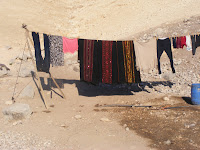Present day Samaria incorporates the two tribes of Ephraim and Manasseh. At the beginning of your Field Study we stopped at a look out in Ephraim that gave us a beautiful view of the Rift Valley. The Rift Valley is the valley created by the Jordan River and the two seas (Galilee and Dead Sea). Here we discussed Israel's initial take over of the Promised Land. Apparently, the tribes of Joseph (bring Ephraim and Manasseh) were the dominant tribes who led the conquest. They were also the largest tribes, which is probably why they were strongest. Interestingly enough, Judah's tribe doesn't come into power until David.
From here we went to a Zionist settlement near Shechem. Apparently, they believe that all the land belongs to them, which is why they will not put up a fence. A fence would represent a boundary line, and since they believe their boundaries include the whole land, a fence would not be appropriate. At the top of this settlement was a wonderful look-out. We could see Mount Gerezim, Mount Ebal, and Shechem. At the North end we could see Manasseh territory and at the South we could see Ephraim territory. One would be surprised how much of the land you can see if you go to the right spot. At this place, there was also a really pretty oak tree, whose leaves were turning and reminding me of Fall.
After lunch time we went to a spot that looked down on Shechem. Therefore, I believe we were standing on Mount Gerezim. Down in the valley is where Joshua gathered all the people of Israel and reminded them of what God had done for them. He challenged the people to choose life and not death. "...choose for yourselves this day whom you will serve...But as for me and my household, we will serve the LORD" (Josh. 24:15). He even challenged them again after they said they would follow the Lord, because he wanted to make sure they were going to sincerely submit their lives to the One True God who had brought them thus far.
I found it very applicable to my own life; that I must choose this day and every day to make God the ruler of my life and not my own desires or sinfulness. That is why Jesus spoke of taking up one's cross daily. You can't just affirm your belief in God one time, but every day live out that faith so you can be a light to the world. I really liked this part of the trip.
Our final stop was at Shiloh. Shiloh is the religious capital of the Northern Kingdom. This is the place that housed the Tabernacle at one point. This is also the place where people would come to communicate with God and find direction. Shiloh is similar to Jerusalem, because it too is isolated and located off of the Patriarchal Highway. These two places must be intentional about staying connected to society. Shiloh and Jerusalem also have barriers to the west that aid in their isolation.
Shiloh is also the place where Eli and his sons were priests. Therefore, Samuel was raised in this place. Eli's sons are good examples of those who tried to use God. They would take the sacrifices made to God for themselves and in many ways defile the holy place of God. This theme of people forgetting that they need to be holy for God to be with them is seen in the battle between Israel and the Philistines at this time. They decided to take the ark to battle as a lucky charm. They didn't realize that the physical ark did not hold power, but the God who dwelt on the ark was the one with the power. This is why they lost and why Eli's sons died. I think it is a good reminder that we need to continually strive to be like Christ, and not rely on our cross necklaces and Christian T-shirts to keep us from harm or in good relationship with God.










































